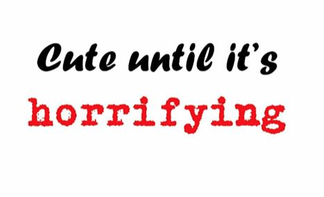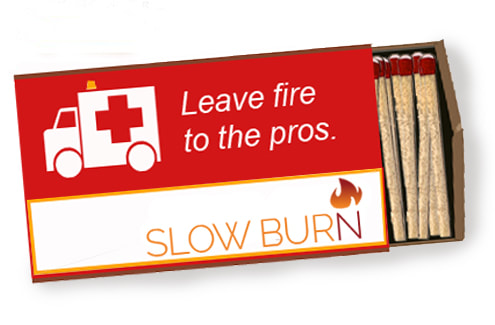 YES, IT'S TIME TO TALK ABOUT THE DECLINE OF WESTERN CIVILIZATION If the selfie stick, Kardashian mania and a profusion of Iggy Azalea videos hadn't already convinced you of the gradual death spiral of culture as we know it, Super Bowl 50 (because Roman numerals are too difficult for the populous--how's that for irony?) should have convinced you. Specifically, you should have been convinced by Mountain Dew's entry into the $5 million 30-second sweepstakes with the horrifying mashup creature whose tiny body dwarfs anything ever to come out of the mind of a glue-huffing Spanish surrealist monster-movie director. If you and your children ran screaming form the den, unable to ever unsee the hell that Mountain Dew hath wrought, you are not alone. Puppy Monkey Baby is now forever seared into our collective conscience as the vilest, most depraved and most cynically calculating commercial character ever to be released from the CGI vault of a major commercial production company. In case you haven't seen it, you may want to watch it now by clicking here. https://youtu.be/ql7uY36-LwA EEGAD, WHY IS THIS HAPPENING! Lest you think we here at the Mountaintop Marketing Fortress are late to the party in our desire to skewer and roast the Puppy Monkey Baby, that it's last week's news, know that we've been doing our best to forget it even existed. But it keeps cropping up. In conversation. In our media feeds. In the middle of the night when we awake, wondering whether that cat sitting at the foot of the bed staring at us in the dark really uttered the guttural phrase, "Puppy Monkey Baby!" And where is that infectious dance music coming from? But really, all of this aside, there is perhaps no better example of how Super Bowl advertising is both acutely applicable and utterly irrelevant to the curator of a small business brand. IGNORE THE CREATURE BEHIND THE CURTAIN! There ya go. Now you're going to forever have an image of the godforsaken, computer-generated spawn of a pug-head, monkey-body, baby-leg face licker lurking behind your living-room drapes. You're welcome. Puppy Monkey Baby in many ways was inevitable. Since Super Bowl advertising has become very much about social engagement, it's easy to imagine the conversation that probably led to this vile creation. "We need a meme!" "You know what happens whenever you try to create a meme--it flops on its side like a crippled minnow." "What are the most popular viral videos of all time?" "Well, the Oogachucka Baby was probably the first." "And people love pug dogs, especially the Super Bowl Doritos pug dog commercial." "And Career Builder's monkey commercials, the Trunk Monkey commercials, monkeys have always been huge." MASHING UP THE SUBJECTS OF THREE OF THE HUGEST VIRAL-VIDEO SUBJECTS EVER? Is it a no-brainer? Is it a huge mistake? And really, what have they done? Other than disturbing some of us into forever avoiding the soda aisle at Safeway? Well, here's one theory. They got people talking. Depending on whose statistics you want to believe, Puppy Monkey Baby was the single most engaging commercial in Super Bowl 50. Of course, a lot of those engaged were expressing their disbelief and horror. BUT WHO WAS THE TARGET CUSTOMER? Here's one safe bet: since the three guys in the commercial look to be in their early twenties, the likely target was teenagers. After all, there's nothing an 18-year old is more interested in being than a 21-year old. All kinds of doors are suddenly (legally) open. And are teenage boys watching this and thinking, "Ew, gross!"? Of course not. That's what their mothers are saying. Which makes the contrarian teen brain think Puppy Monkey Baby is even cooler. And there is no shortage of coverage about how this is one of the worst Super Bowl commercials ever. And you know what that means. EVEN COOLER FOR THE REBEL CONFORMIST! Because let's face it, that's pretty much how most of teenage rebellion works: finding a bunch of angry people who dress alike, dressing like them, and following them around. (No offense to the true teen rebels, some of whom I had the distinct pleasure to know back in the day.) "I want to be different, just like them!" And for the gross-out agers (younger kids who love gross humor and can legally buy an energy drink), this is a gateway product for getting them hooked. Sorry, is that too cynical? Here's the bottom line. It doesn't matter how many pundits tell us this is an awful commercial. WE HAVE NO IDEA ABOUT MOUNTAIN DEW'S STRATEGERY We can make guesses. But we are really, totally in the dark about what anyone there, at their $63 billion parent company or at BBDO New York was thinking. But it certainly generated a media buzz for a soft drink that gives you a caffeine buzz. And we can probably be guaranteed of this: everyone involved knew this was over-the-top borrowed interest. There is absolutely nothing about a Puppy Monkey Baby that is in any way relevant to Mountain Dew Kickstart. (You didn't even remember the name of the product, did you?) This is exactly the kind of thing a good class in advertising creative teaches you not to do. And they did it. Gleefully, no doubt. AND NOW IT HAUNTS YOUR DREAMS But what does it have to do with small business brand marketing? Not a whole lot. Unless you're looking for an example of how to break the rules. This is a hugely disruptive message. It is not an enormously salient message. But if we go back to the Trunk Monkey (something that was discussed here in the screed years ago), it's an example of how commitment to an irrelevant idea can ultimately lead to sales--especially if you're in a category where nobody has any idea how to differentiate themselves from the competition. If you've never seen these videos, the trunk monkey is a dealer-installed option on Subaru cars. Push a button inside the car, and the trunk pops open and a chimpanzee pops out. The "monkey" does things like defeat car theft, deal with irate drivers in traffic, and administer first aid. SEE ALSO: GEICO The vast majority of GEICO's advertising has nothing to do with auto insurance. But they've committed to their sense of humor, they always include their USP, and they spend horrifying amounts of money to make it work. Borrowed-interest advertising--the use of an irrelevant creative idea to drive a sales message--is always pointless. Until it isn't. Could you make something as insane and pointless as Puppy Monkey baby work in your own advertising? Maybe. We would also never recommend trying. But if you're going to try, you better have a strategy, tactics, and a seriously strong stomach. Because you're going to need it.
0 Comments
|
AuthorBlaine Parker is prone to ranting about any and all things related to brand. In many ways, he is a professional curmudgeon. While there is no known vaccine for this, the condition is also not contagious. Unless you choose it to be so. Archives
February 2022
Categories
All
|
|
© Copyright 2020 Slow Burn Marketing LLC |

 RSS Feed
RSS Feed

